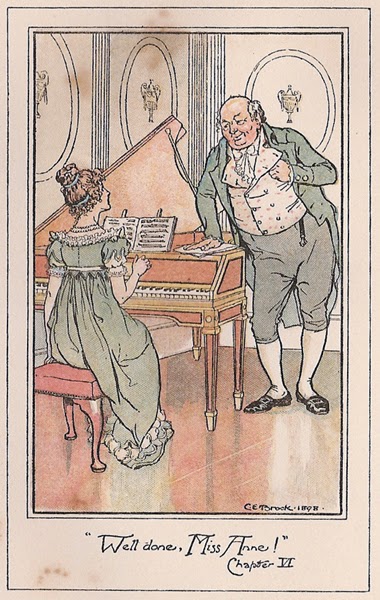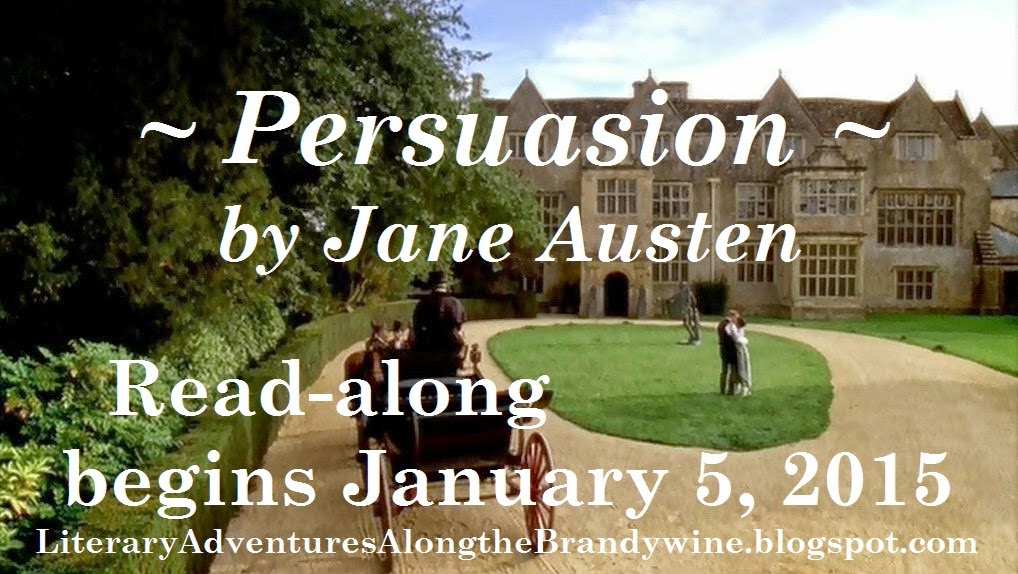This read-along is hosted by Heidi at Literary Adventures Along the Brandywine.
Book I – Chapters 6 – 12
Anne settles into living with Charles and her sister, Mary, and the Crofts settle into housekeeping at Kellynch-Hall. At Captain Wentworth’s arrival, Anne is nervous to confront him again, but their meeting is delayed by an accident that incapacites her nephew, and Mary, content to abandon her motherly duties, leaves him in Anne’s care. Charles’ sisters, the Miss Musgroves named Henrietta and Louisa, vie for Wentworth’s attentions, and the other young ladies of the area are taken with his soldierly bearing and, no doubt, his fortune made during the Napoleonic Wars. When he and Anne finally meet, the exchange is cool and there appears to be no hope of a rekindled romance. The re-appearance of Henrietta’s beau, Charles Hayter, appears to complicate matters, as Henrietta’s interest has cooled towards him and warmed to Wentworth. Yet with a visit to the Hayters, the tides turn again and Louisa is the favourite for winning Wentworth’s hand in marriage. There are glimmers of a returning regard in Wentworth’s manner towards Anne, and as the party travels to Lyme for an outing, we are introduced to the characters of Captain and Mrs. Harville, and Captain Benwick, a man engaged to Mrs. Harville’s sister, but with the death of the unfortunate young lady, he is left in mourning. Yet a tragic accident on the waterfront of Lyme focuses Wentworth’s attention on Louisa, who remains in a type of coma, while the drama swirls around her. Once again, Anne is a strong nurturing force within the tumult and her strength of character shows her worth.
 |
| Well done, Miss Anne! Chapter 6 source Wikimedia Commons |
Thoughts: Austen treats us to lively accounts of the characters. She really gives equal attention to them all, and in keeping with Anne’s retiring character, (in the first three chapters of this section at least) it sometimes felt that Anne was confined to the periphery of the story. Yet as these final chapters wrap up, she is shown as having an ability at lively conversation and empathy, as evidenced by her chats with Captain Benwick and her sympathy towards him at the loss of his affianced.
I did find the situation of Louisa’s tragic fall and the subsequent confusion of the men surprisingly obvious for plot development and somewhat forced, lacking the pacing and the insightful subtleties that I’m so used to experiencing with Austen’s novels. I could understand Charles being paralyzed by the situation, as he tends to avoid conflict in any case, but the fact that Captain Wentworth was in a dither rather diminished his character for me. He is a captain, used to being in charge and commanding during critical situations. For him to need lean on Anne was rather implausible, unless he is head over heels in love with Louisa, which then could logically make his good sense fly out the window. But we know that he’s not, which makes the scene very un-Austenesque.
Otherwise, there is a mystery that crops up during the end of the last chapter ……. a vaguely familiar person passes them in Lyme and they determine that it is Mr. Eliot, their cousin and heir to Kellynch Hall. Just what is he doing there and how will his presence affect further outcomes in the novel?
 |
| Anne & Wentworth “Here is a nut,” he said, to exemplify. source Wikimedia Commons |



Interesting observation of Charles following Louisa's fall. It was a little overly exaggerated. Men are usually rational and cool-headed under such circumstances. During my first read, I thought it was because of his feelings for Louisa, but I know better this time.
It seems like Austen wants us to think that he's interested in Louisa …… which is a not very subtle ploy to divert our attention. I expected more of Miss Austen.
Hand on my heart, I have to agree, that Louisa's fall seemed contrived and very usual, but then to defend Ms. Austen, she died before she could revise her first draft and what we read today is the first completed but non-revised edition of her work. Had she had the time to revise it a bit more, may be, it would not have seemed so artificial and abrupt and may have flowed as smoothly as P&P or S&S. I am glad that Ann is perking up! She gains more substance as the plot moves forward
While Lydia's elopement in P&P was as dramatic, it tied together so many elements of the novel, whereas with Louisa's fall, I find myself saying so what? What is the point of it? But your are absolutely right, and so I'm willing to give Austen the benefit of the doubt, especially considering the complexity of her other novels that she was able to revise.